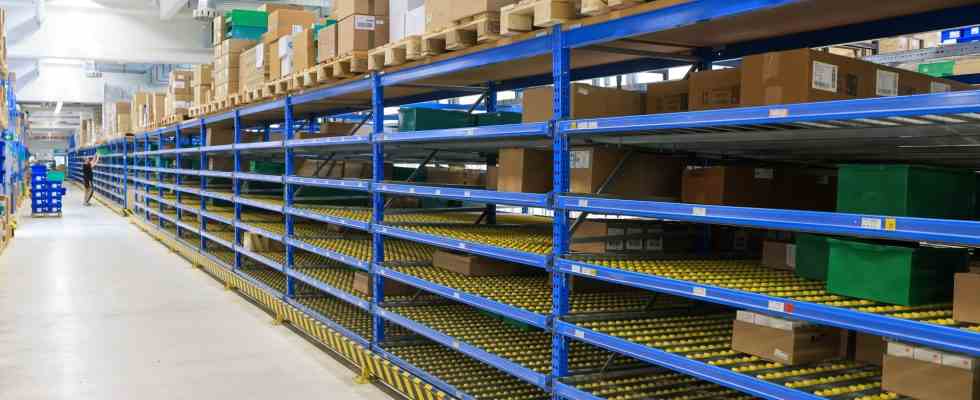As of: 03/19/2023 4:03 p.m
Waiting for months for the craftsman, standing in front of empty shelves or closed restaurants: many Germans are experiencing this for the first time during the crisis – at least in the West.
There is a lack of material, there is a lack of staff. A scenario that Gregor Gysi knows from the days of the GDR. Having to wait nine months for a spare part today reminds the left-wing member of the Bundestag of old times: “Long waiting times for car repairs, that can’t be true. I really know that from before.” In November 1976, East German television reported that only 76 percent of all motor vehicle repairs could be carried out within reasonable waiting times.
In a market economy this was previously unthinkable. For many years there was no material shortage in the automotive industry. 74 percent of companies in the automotive industry are now complaining about bottlenecks. Unlike Gregor Gysi, many people experience the consequences of deficiency in everyday life for the first time.
Where the market economy fails
Steffen Clement, HR, plus minus 9:45 p.m., March 14, 2023
“Really Something New”
After all, that didn’t even happen during the financial crisis of 2008/2009, according to economist Marcel Fratzscher from the German Institute for Economic Research (DIW). “Having a shortage, not knowing how to produce products or where to get something familiar: That’s really something new, because we didn’t actually know that in the last few decades. The global financial crisis of 2008/2009 was more focused on banks .”
The new – and for ex-GDR citizens renewed – experience of shortage does something to the people, according to Gysi. After all, it affects society as a whole: “Since the rich are also affected when something no longer exists, there is a strange sense of equality again.”
Diversification versus dependencies
Satisfied united in lack? The unanimous opinion was that this should never be the goal of companies in the market economy. So, after decades of cost optimization, companies have to laboriously rethink: “You can’t put everything on one horse. So you have to have several suppliers, not just one anymore. And maybe not just in China, but also in Brazil, the USA and also in China,” says Fratzscher. You just have to accept higher costs from suppliers as long as new suppliers improve their own ability to deliver.
Too few staff in many sectors
In addition to the material bottlenecks, the lack of personnel is also causing problems for many companies: The traditional company Rössle in Weinstadt near Stuttgart is also feeling the effects. Boss Beate Linsemaier lacks employees, 50,000 positions are vacant. The result: the hotel and restaurant remain closed for two weeks for the first time in summer. In addition, the inn is now closed every Sunday evening.
Linsemaier very much regrets the development: “We were always well attended on Sunday evening, now we just can’t handle it. There’s nobody there and I can’t do it alone. It’s bitter, even for the guests. But I can’t change it .”
The challenge for companies is likely to become even greater in the near future, explains Fratzscher: “If there are fewer workers, companies will have to compete more intensely for employees. This will lead to the wages of employees rising more sharply and thus also prices of the products.”
Eleven weeks waiting time at the craftsman
Shortage of personnel and materials: Both are part of everyday tradesman life in Wiesbaden at Baumstark Haustechnik, a company with 80 employees. Company boss Theo Baumstark would like to employ half a dozen specialists – but so far his search has been unsuccessful. “I would hire someone who gets up to 60,000 euros a year for customer service. But you can’t get them for that money either. We introduced a four-day week. That doesn’t mean that there is a big rush now either.” , so strong.
“Still the right model”
The waiting times are getting longer and longer everywhere. After placing an order last year, customers had to wait around eleven weeks for the craftsman to ring the bell. For comparison: ten years ago it was only seven weeks. The situation is even more dramatic for those who want to cover their roof or build a new one: 16 weeks waiting time for the construction workers. Ten years ago it was only about nine weeks.
It is the beginning of new times. But despite the unusual weakness of the market economy, despite all the mistakes, business and politics agree: In a planned economy everything would be much worse. “The market economy and the social market economy are still the right model. We just have to reform them and make them sustainable so that we have fewer shortages, fewer problems and less loss of prosperity due to these crises in the future,” said Fratzscher.

